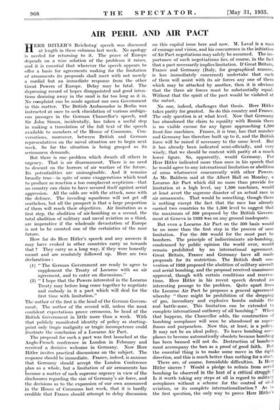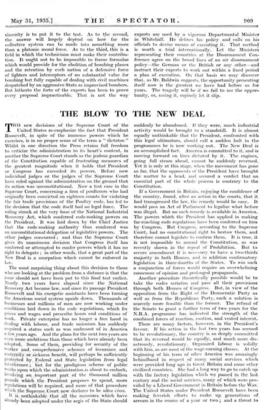AIR PERIL AND AIR PACT
HERR HITLER'S Reichstag- speech was discussed at length in these columns last week. No apology is needed for returning to it. The peace of Europe depends on a wise solution of the problems it raises, and it is essential that wherever the speech appears to offer a basis for agreements making for the limitation of armaments its proposals shall meet with not merely a cordial but • an immediate response from the other Great Powers of Europe. Delay may be fatal. The depressing record of hopes disappointed and good inten- tions draining away in the sand is far too long as it is. No complaint can be made against our own Government in this matter. The British, Ambassador in Berlin was instructed at once to seek elucidation of various ambigu- ous passages in the German Chancellor's speech, and Sir John Simon, incidentally, has taken a useful step in making a translation of the full text of the speech available to members of the House of Commons. Con- versations, moreover, between British and German representatives on the naval situation arc to begin next week. So far the situation is being grasped as its seriousness demands.
But there is one problem which dwarfs all others in urgency. That is air disarmament. There is no need to descant on the horrors of air warfare of the future. Its potentialities are unimaginable. And it remains broadly true—in spite of some exaggerations which tend to produce as reaction a too complacent scepticism—that no country can claim to have secured itself against aerial aggression. All the odds are with the attack, none with the defence. The invading squadrons will not get off scatheless, but all the prospect is that a large proportion of them will reach their objectives. Air limitation as a first step, the abolition of air-bombing as a second, the total abolition of military and naval aviation as a third, are imperative if the wholesale devastation of Europe is not to be counted one of the certainties of the near future.
How far do Herr Hitler's speech and any answers it may have evoked in other countries carry us towards that ? They carry us a long way, if they were honestly meant and are resolutely followed up. Here are two declarations : (1) " The German Government are ready to agree to supplement the Treaty. of Locarno with an air agreement, and to enter on discussions."
(2) " I hope that the Powers interested in the Locarno Treaty may before long come together to negotiate and embody in it a pact which will deal for the first time with limitation."
The author of the first is the head of the German Govern- ment. The author of the second will, unless the most confident expectations prove erroneous, be head of the British Gdvernment in little more than a week. With that publicly manifested identity of policy as starting- point only tragic malignity or tragic incompetence could frustrate the conclusion of a Locarno Air Pact.
The proposal for such a pact was first launched at the Anglo-French conference in London in February and received a decisive welcome in Germany. Now Herr Hitler invites practical discussions on the subject. The response should be immediate. France, indeed, is anxious that Germany should accept the London Conference plan as a whole, but a limitation of air armaments has become a matter of such supreme urgency in view of the disclosures regarding the size of Germany's air force, and the decisions as to the expansion of our own announced in the House of Commons last week, that it is hardly credible that France should attempt to delay discussion on this capital issue here and now. M. Laval is a man of courage and vision, and his concurrence in the initiation of Air Pact negotiations may safely be assumed. The im- portance of such negotiations lies, of course, in the fact that a pact necessarily implies limitation. If Great Britain, France and Germany (Italy, for geographical reasons, is less immediately concerned) undertake that each of them will assist with its air forces any one of them which may be attacked by another, then it is obvious that the three air forces must be substantially equal. Without that the spirit of the pact would be violated at the outset.
No one, indeed, challenges that thesis. Herr Hitler takes parity for granted. So do this country and France. The only question is at what level. Now that Germany has abandoned the claim to equality with Russia there is no visible excuse for any figure approaching 1,500 front-line machines. France, it is true, has that number and Germany has therefore built up to it, and the British force will be raised if necessary to the same level. But it has already been indicated semi-officially, and very wisely, that we should be content with parity at a much lower figure. So, apparently, would Germany. For Herr Hitler indicated more than once in his speech that he would agree to any international limitation or abolition of arms whatsoever concurrently with other Powers. As Mr. Baldwin said at the Albert Hall on Monday, a Locarno Air Pact which did no more than provide for limitation at a high level, say 1,500 machines, would at least avert the supreme disaster of an actual race in air armaments. That would be something, though there is nothing except the fact that the race has already carried two countries to the 1,500 level to suggest that the maximum of 500 proposed by the British Govern- ment at Geneva in 1933 *as on any ground inadequate.
But even a Locarno Air Pact on the 500 basis would be no more than the first step in the process of sane limitation. For the 500 would for the most part be bombers. The principle of indiscriminate air-bombing, condemned by public opinion the world over, would remain prohibited by no international agreement. Great Britain, France and Germany have all made proposals for its restriction. The British draft con- vention of 1938 proposed the abolition of military aircraft and aerial bombing, and the proposal received unanimous approval, though with certain conditions and reserva- tions. Herr Hitler in his recent speech devoted an interesting passage to the problem. Quite apart from the Locarno Air Pact he proposes a general agreement whereby " there might be prohibition of the dropping of gas, incendiary and explosive bombs outside the real battle-zone. This limitation can be extended to complete international outlawry of all bombing." When that happens, the Chancellor adds, the construction of bombing aeroplanes will soon be abandoned as super- fluous and purposeless. Now this, at least; is a policy. It may not be an ideal policy. To leave bombing aero- planes to become automatically obsolete because bombing has been banned will not do.' Destruction of bombers must accompany the ban as a proof of good faith. But the essential thing is to make some move in the right direction, and this is much better than nothing for a start. There are, of course, formidable difficulties. Is Herr Hitler sincere ? Would a pledge to refrain from aerial bombing be observed in the heat of a critical struggle ? Is it worth taking any steps at all in regard to military aeroplanes without a scheme for the control of civil aviation, or its complete internationalization ? As to the first question, the only way to prove Herr Hitler's sincerity is to put it to the test. As to the second, the answer will largely dep€nd on how far the collective system can be made into something more than a platonic moral force. As to the third, this is a field in which the technicians must make their contribu- tion. It ought not to be impossible to frame formulae which would provide for the abolition of bombing planes and the retention by each nation of a defensive force of fighters and interceptors of no substantial value for bombing but fully capable of dealing with civil machines despatched by an aggressive State as improvised bombers. But hitherto the forte of- the experts -has been to prove every proposal impracticable. That is not the way experts are used by a vigorous Departmental Minister in Whitehidl: He defines his policy and calls on his officials to devise means of executing it. That method is worth a trial internationally. Let the Ministers representing their countries at the Disarmament Con- ference agree on the broad lines of an air disarmament policy—the German or the British or any other—and instruct their experts to work out within a fixed period a plan of execution. On that basis we may discover that, as Mr. Baldwin suggests, the opportunity presenting itself now is the greatest we have had before us for years. The tragedy will be if we fail to see the oppor, tunity, or, seeing it, supinely let it slip.



























































 Previous page
Previous page